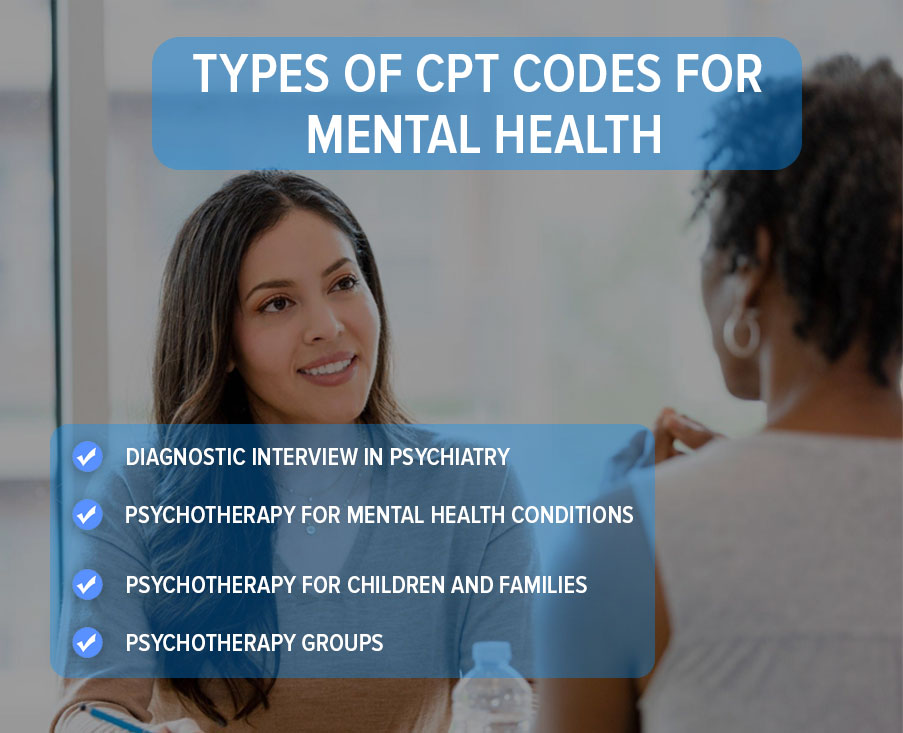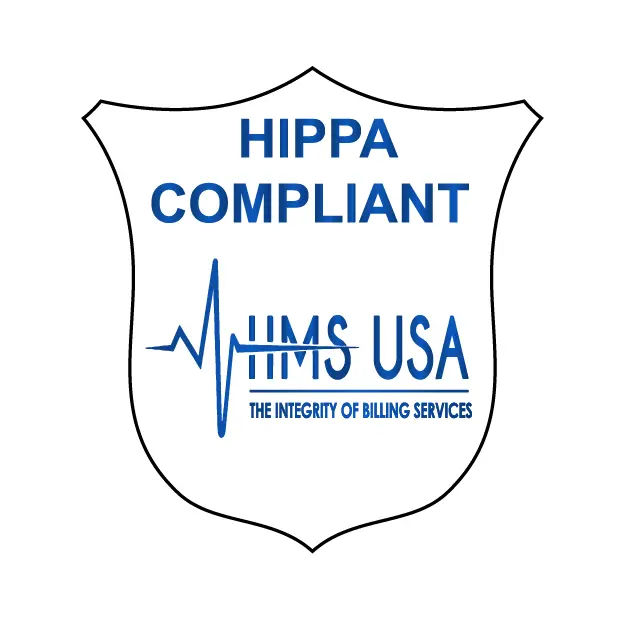
What are the CPT Codes for Mental Health Billings? – 2024
Are you starting mental health billing in 2024? Crack the code literally! Mental health insurance claims require CPT codes, a special secret. Not only do you get compensated, but you also avoid audits. Mastering behavioral health CPT billing codes is the key to navigating mental health billing.”
Understanding your mental health CPT codes is vital in getting full pay and avoiding insurance audits. This is especially helpful for managed care panel therapists and those creating superbills for clients. Applying mental health billing codes and adding add-on codes that define the treatment is vital to insurer reimbursement.
The several codes follow different rules. However, medical coding expertise can maximize reimbursement. Keep current with the latest procedural terminology for behavioral health CPT codes for mental health treatments to save time and streamline billing.
What Are CPT Codes for Mental Health?
The American medical association (AMA) has created and maintains a uniform and specialized medical code set, Current Procedural Terminology (CPT). All medical operations, from psychotherapy to radiography to surgery, are define and describe in detail by CPT codes which are five-digit numeric numbers.
These CPT Codes for Mental Health are essential for billers in way to process who wish to get paid in full for their services and avoid insurance checks.
Several criteria, such as the insured’s location and professional qualifications, influence how much an insurance company will pay for medical care. CPT billing codes for mental health detail the duration of a client’s psychotherapy session or diagnostic interview. To be paid by health insurance companies, you must use CPT for mental health billing services.
Different Types of CPT Codes for Mental Health
Mental health billing codes may be brake down into three classes.
Category I
Category I codes often take up most of a coder’s time. These CPT billing Codes for Mental Health regulations are brake down into specific chapters for each medical specialty.
The CPT codebook covers six branches of medicine: evaluation and management, medical, surgical, radiological, anesthetic and pathological, and laboratory. There are specific rules and limitations for each. All CPT codes in the first category have five digits.
Category II
In second category’s codes for mental health have four numbers and an F at the end. Coding under Category II is entirely optional. They supplement the information provided by Category I and III codes but do not replace them.
Category III
CPT billing Codes for Mental Health in Category III means to be use temporarily and indicate novel or unproven methods or technologies. You could resort to Section III if you still need to identify an innovative procedure in Section II. The last digit of a Category III code, always four, is always a T.
Each of these divisions corresponds to a particular area of healthcare and includes related recommendations. Therapists often use the mental health CPT codes 90832–90853 in psychiatry as an example. Evaluation and management codes may be used to provide general medical services by psychiatrists, primary care doctors, and other approved prescribers. Learn More about billing solutions.
As time goes on, CPT codes undergo multiple modifications. You can add Two-digit or two-letter modifiers to a CPT code. They detail the most crucial steps of a process.
Some CPT billing codes for mental health in parenthesis indicate when an alternative, more efficient code must be use. If a billing claim is to be approve for mental health services, the associated codes should be as straightforward as possible.
How Do CPT Codes for Mental Health Work?
Use Current Procedural Terminology (CPT) coding when filing a claim with your insurance company. Health insurance companies need CPT and ICD-10 codes to get the whole picture; both are requires for payment.
The CPT number specifies the services rendered, whereas the ICD code identifies the patient’s condition and the reason for therapy.
Mental health CPT codes can be improves with instructions in parentheses below them. The codes must as details as humanly feasible for a billing claim to be considered for mental health services.
4 Types of CPT Billing Codes for Mental Health Services

There are four distinct categories of CPT codes. Using these classifications, you may quickly identify the necessary source code.
Diagnostic Interview in Psychiatry
- Code 90801: Psychological evaluation using an in-person interview.
- Code 90802: Diagnosis by psychiatric interview and consultation.
Psychotherapy for Mental Health Conditions
- Codes 90804-90809: Cognitive behavioral therapy, interpersonal psychotherapy, and/or supportive psychotherapy.
- Codes 90810-90815: Interactional psychotherapy (IPT).
Children and Families
- Code 90846: Psychotherapy for families (with the patient absent).
- Code 90847: Therapy for the whole family (with the patient present).
- Code 90849: Multi-family psychotherapy.
Groups Psychotherapy
- Code 90853: Psychotherapy groups that don’t include more than one family.
- Code 90857: Participatory Group Psychotherapy
10 CPT Billing Codes for Mental Health Frequently Used in Mental Health Billings
Though numerous CPT codes can be used for mental health services in general, only a limited number would be practical in a therapy session. Accurately and efficiently billing for mental health services requires knowledge of CPT codes which most frequently used for mental health.
As a therapist, these are the most often use these codes you can expect to see.
1. 60 minutes of Psychotherapy - Code 90837
Individual psychotherapy sessions with a client and/or family member, 60 minutes each.
Session duration: 60 minutes (about 53-60 minutes in use).
2. 45 minutes of Psychotherapy - Code 90834
Individual psychotherapy sessions typically last 45 minutes and may include the client’s family.
Session Duration: 45 minutes (roughly between 38 and 52 seconds).
3. Evaluation for Psychiatric Diagnosis Independent of Treatment - Code 90791
Evaluation for psychiatric diagnosis separate from treatment (ICD-90791)
Initial consultation for diagnosis only; no treatment provided. All aspects of the patient’s mental health are evaluate, not only the patient’s main complaint and recent medical history.
Note: The first medical assessment may request using the 90792 code.
Session Duration: Not time-based
4. 50 Minutes of Family Psychotherapy - Code 90847
Family psychotherapy, also known as conjoint psychotherapy, is carried out in the patient’s presence). It applies to couples counseling as well.
Session Duration: 50 minutes
5. Group psychotherapy (other than multiple-family groups) - Code 90853
Psychotherapy sessions involve numerous people from the same family. It is a method that looks at the pathophysiology of the group as a whole by analyzing the dynamics among its members.
Individual client members’ actions and perspectives are altered based on observations of group dynamics.
Session Duration: Not time-based.
6. 50 Minutes of Family Psychotherapy - Code 90846
Individual therapy, which family members of a client attend in their place to help facilitate the client’s healing process.
Session Duration: 50 minutes.
7. Other Psychiatric Services and Treatments - Code 90875
The personal psychophysiological treatment combines psychotherapy (e.g., insight-oriented, behavior-modifying, or supportive psychotherapy) with biofeedback training of any modality (in person with the client).
Session Duration: 20-30 minutes.
8. Psychotherapy for 30 Minutes - Code 90832
Psychiatric consultations with a single patient, 30 minutes each.
Session Duration: 30 minutes (16-37 minutes of actual use).
9. 60 Minutes of Psychotherapy with E/M included - Code 90838
When coupled with an E/M service, this describes an individual psychotherapy session lasting 60 minutes with the client and/or family.
Session Duration: 60 minutes (about 53-60 minutes in use).
10. Individual Counseling under Preventative Medicine - Code 99404
Describes the process of providing a person with preventive medicine advice and/or intervention to lower risk factors (a stand-alone operation).
Session Duration: 60 minutes (about 53-60 minutes in use).
CPT Codes Modifiers And Their Use In Mental Health Billing

Insurance companies may get more insight by using code modifiers used with the CPT billing codes for mental health.
Service providers’ certifications, delivery schedules, and method descriptions can be modify.
- Modifier 25
In most cases, only one code is needed to define a session in detail. However, there are times when an E/M service is required on the same day. The usage of modifier 25 indicates that the specified service is distinct and reimbursable.
Modifier 25 may only be use with these numbers: 99201-99215 and 99341-99350.
- Modifier 59
When a non-E/M procedural procedure is done on the same day as an E/M service, the modifier 59 is applied in the same way as modifier 25. Remember that your documentation must be suitable for a stand-alone conference.
- Modifier GT
It is typically used in real-time audio and video telehealth consultations.
- Modifier UT
It will activate when medical personnel identify a patient in immediate danger.
Conclusion
Learning mental health CPT billing codes is a great way to streamline your billing process. Keep track of each code’s requirements and check to stay current on billing changes.
Consistency matters! If you frequently provide specified services, incorporating these targeted behavioral health CPT codes for 2023 into your billing processes can boost your chances of full reimbursement. Using precise service and add-on codes optimizes compensation.
FAQs
Psychological evaluations are billed at 96130 for the first hour, with 96131 added for each extra hour.
The Psychiatry part of the CPT codebook contains the mental health procedure codes (90785-90899).
Examination and management (E/M) codes or CPT code 90792 may be used for a mental diagnostic analysis, including a medical assessment.
In contrast to ICD-10 numbers, which indicate patients’ diagnoses, CPT codes identify the services performed.
The CPT can classify CPT codes 90875 or 90876 as individual psychophysiological therapy incorporating biofeedback training (face-to-face with the patient) or psychotherapy (the insight directed, behavior-modifying, or supportive psychotherapy). CPT codes 90804-90809 and 90816-90822.







